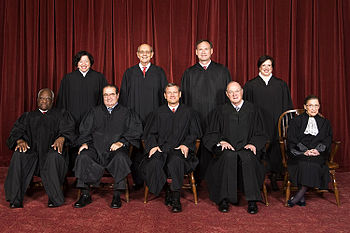 Image courtesy of the Wikimedia Foundation
Image courtesy of the Wikimedia Foundation
On Tuesday, the Supreme Court of the United States agreed to hear another controversial case, only instead of ruling on healthcare or immigration, they will now be passing jugement on a contested affirmative action policy. Becasue of its high political stakes, it is sure to garner national attention in the coming months.
The facts of the case sound strikingly similiar to those of Gratz v. Bollinger, the 2003 decision that deemed the University of Michigan’s undergraduate affirmative action policies unconstitutional. This time, however, its the University of Texas system that’s underfire. In 2001, it adopted a policy that allowed the state university to automatically admit any Texan graduating within the top ten percent of his or her high school class. Abigail Noel Fisher applied for admission for the Fall of 2008. Finishing outside of the top tier of her graduating class, she had to compete with both out-of-state students and other students whose GPA did not warrant their automatic acceptance for the remaining spots. After being denied while observing “less qualified” minority applicants get in, she sued, claiming that she was discriminated against when competing for a spot because of her race. This, her counsel contends, violates the equal protection clause under the Constitution.
The nation’s High Court has already ruled on this issue twice in the past ten years, striking down the University of Michigan’s “minority point accumulation system,” but later upholding its law school’s policy of making race a factor within a “wholistic evaluation.” With subsequent changes in the bench, however, the court may set a new precedent that looks less favorabely upon the consideration of race in admissions. Since then, Justice Samuel Alito has replaced Sandra Day O’Connor as a more reliable opponent to such policies. At the same time, affirmative action adovcate, Elana Kagan, has announced her decision to recuse herself. This leaves the possibility of a 5-3 vote against the University of Texas’s policy. However the vote breaks down, this case is sure to be a high profile subject of controversy in the months ahead.
–George Mendoza

Be the first to comment on "The Supreme Court to Hear Controversial Case out of Texas"